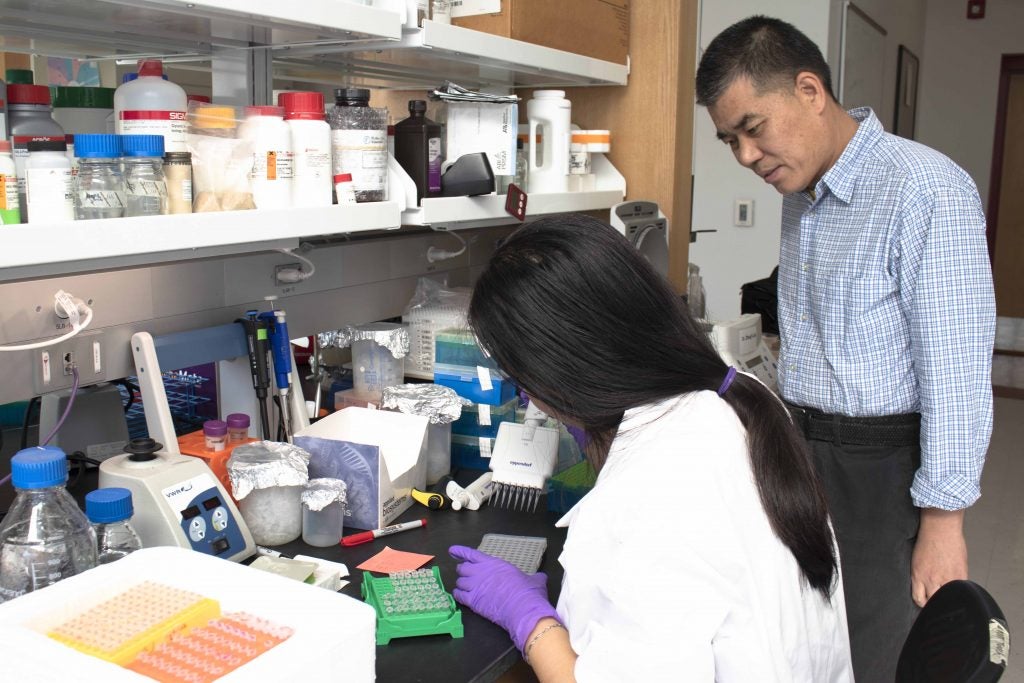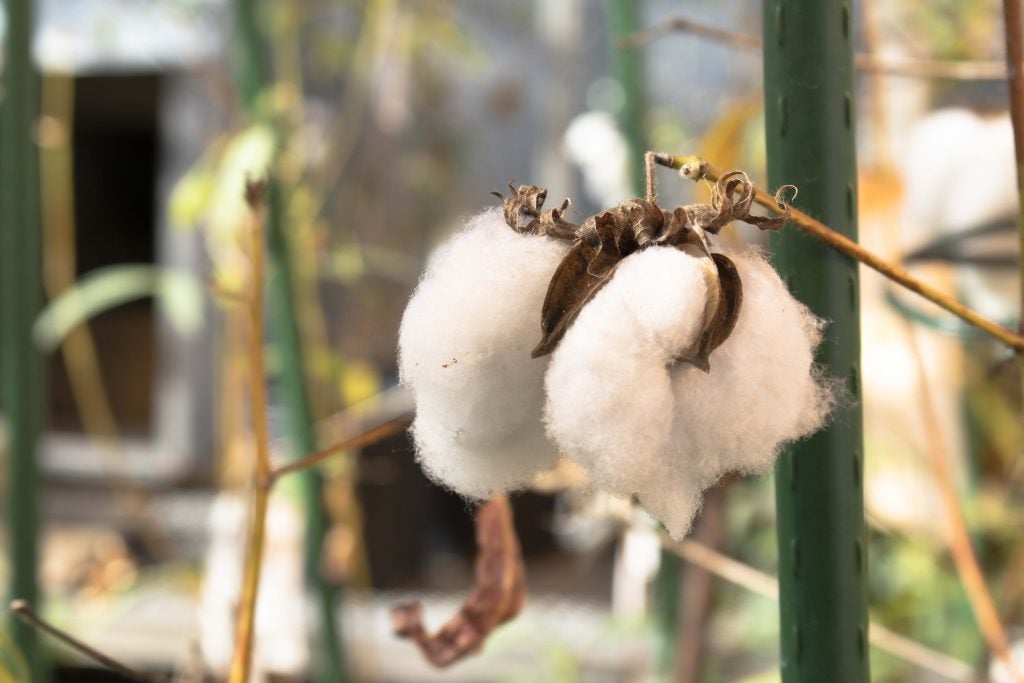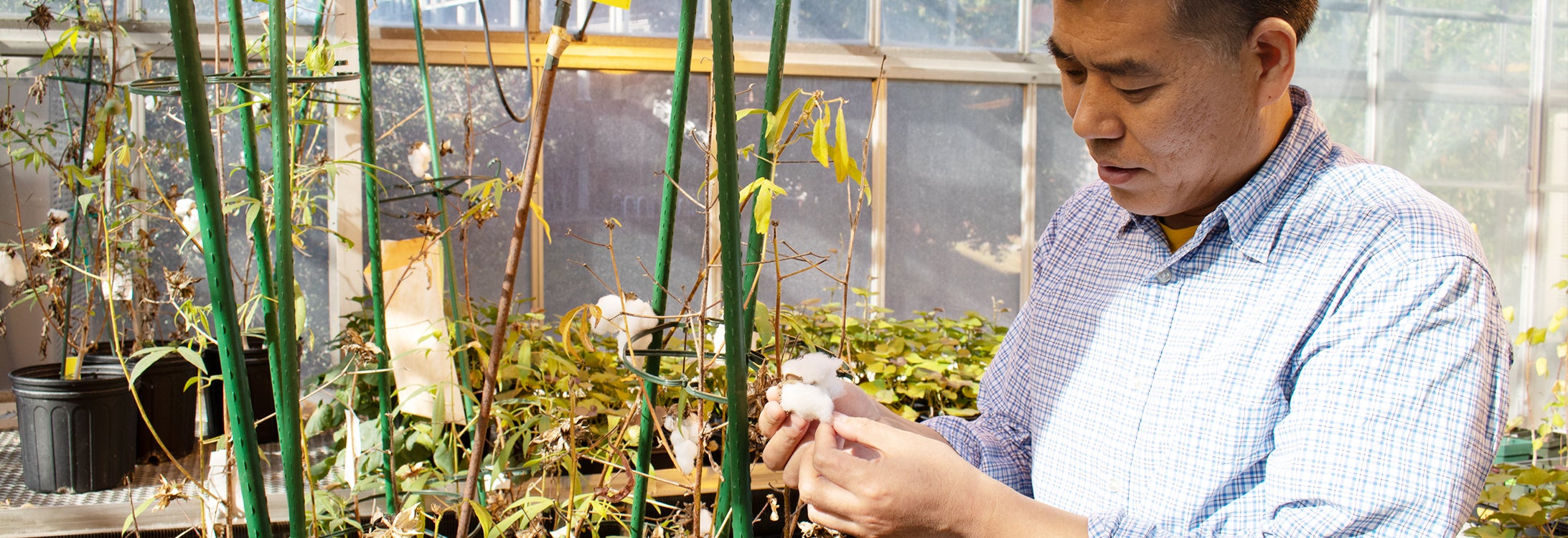DISTINGUISHED DISTINCTION
Professor named national fellow for scientific contributions
In the 1980s and early ’90s, a commercial jingle described cotton as the “fabric of our lives.”
Nearly three decades later, cotton truly has been an important fiber for East Carolina University’s Baohong Zhang. After spending his academic career studying the fiber, Zhang’s hard work paid off this week as the Thomas Harriot College of Arts and Sciences Distinguished Professor was named a fellow to the American Association for the Advancement of Science.
Zhang was recognized for his contributions in plant science, particularly for his discoveries on microRNAs and cotton biology.

Thomas Harriot College of Arts and Sciences Distinguished Professor Baohong Zhang, right, works in his lab with visiting international scholar Caiping Cai of Nanjing Agricultural University.
“This is one of the highest honors I’ve ever received,” Zhang said. “It’s very exciting to be selected and recognized by the scientific community across the country.”
The association named 416 fellows this year, selected by peer AAAS members, for their distinguished efforts to advance science and its applications. The AAAS fellows program began in 1874 and includes well-known scientific leaders such as Thomas Edison, James Allison, Margaret Mead and Carl Sagan.
Zhang is the third AAAS fellow to be selected from ECU. Department of Microbiology and Immunology professor Roy Roop was selected as a fellow from the Brody School of Medicine in 2014. Ronald Slay, who served as the first academic dean of ECU, was named a fellow in 1931.
“This recognition of Dr. Zhang from the AAAS sends a strong signal to the scientific world about ECU’s capacity and talent for meaningful, mission-driven science,” said Ron Mitchelson, ECU provost and senior vice chancellor for academic affairs. “I am proud of Dr. Zhang and pleased that another ECU scientist has gained notoriety among their peers. ECU has a rapidly-growing reputation for academic quality and this is further testimony to the excellence we all aspire to.”
Zhang’s research focuses on microRNAs and their role in gene regulation and expression. First recorded in 1993, microRNAs play a key role in a wide range of biological processes, including cell growth, development and stress response.
Zhang uses the genome-editing tool CRISPR/Cas9 to manipulate both protein-coding and microRNA genes and published the first paper in the cotton research field regarding the application of this tool to knockout a cotton gene. By “knocking out” certain genes to study their functions, he is able to shape how the plant produces the fibers used in clothing and other materials, while altering how cotton responds to outside stressors like extreme environments and climate changes. Zhang said his lab was the first in the world to successfully apply the CRISPR/Cas9 technology on cotton gene expression.
“We all need food and we all need clothing,” Zhang said. “My research seeks to figure out how microRNAs contribute to the development of crops, specifically cotton fiber. If we can pinpoint which microRNAs and genes affect fiber growth, we can use that knowledge to produce higher crop yields, bettering our lives.”

Baohong Zhang’s lab manipulates certain genes in cotton plants, shaping how it produces fibers used in clothing and other materials.
Zhang said his love of cotton began at a young age in China. He carried that passion with him to the United States, where he earned his doctorate in environmental toxicology from Texas Tech University.
“In China, both of my parents worked in the countryside, particularity farming cotton,” he said. “I was very interested in cotton and genetics growing up. After attending the Beijing Agricultural University and working at the Chinese Academy of Agricultural Sciences’ Institute of Cotton Research for 11 years, I came to America and continued my plant research before finding a home at ECU.”
After 12 years as a Pirate, the Department of Biology member said he owes much of his success to his students and research partners.
“My achievements have all been because of the visiting scholars, postdocs, graduate students and undergraduates that have come through my lab, along with my wonderful colleagues in the biology department and around the world,” Zhang said. “I appreciate all of their hard work because without them, my lab could not have reached the goals it set out to accomplish.”
During his time at ECU, Zhang has secured more than $800,000 as a primary investigator in research funding from federal agencies and industries including the National Institutes of Health, the National Science Foundation, the Department of Defense, Cotton Incorporated and DuPont, melding his basic scientific research with real-world industrial applications.
“Dr. Zhang’s contributions to molecular genetics have been well recognized by his peers,” said Jay Golden, ECU vice chancellor for research, economic development and engagement. “Our faculty strive not only to make impacts in basic scientific research, but to make significant advancements in people’s daily lives. The improvements in crop production Dr. Zhang is attempting to unlock will have major implications in the future of the industry.”
Zhang will be presented with an official certificate and pin to commemorate his selection as a fellow in February at the 2019 AAAS annual meeting in Washington, D.C. A full list of this year’s fellows can be found at the AAAS website.
About ECU
Founded in 1907, ECU is a nationally recognized public university in Greenville, N.C., preparing its students to live, work and compete in the 21st century. Through its Rural Prosperity Initiative, ECU has renewed its commitment to scientific exploration, committing to combat health, economic and educational disparities faced by community members living in rural areas. The university is an internationally recognized leader of community engaged scholarship, having achieved the elective Carnegie Foundation for the Advancement of Teaching’s Community Engagement Classification in 2008.
About the American Association for the Advancement of Science
The American Association for the Advancement of Science is the world’s largest general scientific society and publisher of the journal, Science. The association was founded in 1848 and includes nearly 250 affiliated societies and academies of science, serving 10 million individuals.
